Corporations and Ethics: Banking Royal Commission and its Impact on the Australian Financial Services Industry
VerifiedAdded on 2022/11/28
|8
|2499
|134
AI Summary
This article discusses the impact of the Banking Royal Commission on the Australian financial services industry, focusing on the major banks and the regulatory authorities. It explores the scandals revealed by the commission and the recommendations made to strengthen consumer protection and remove conflicts of interest. The article also highlights the role of the financial services sector in the Australian economy and the need for regulatory action.
Contribute Materials
Your contribution can guide someone’s learning journey. Share your
documents today.

TOPIC 9 CORPORATIONS AND ETHICS
The Royal Commission into Misconduct in the Banking, Superannuation and Financial
Services Industry revealed scandals that shocked Australia
There are four major banks, which dominate the banking sector in Australia. These are the
Commonwealth Bank of Australia, Australia and New Zealand banking Group, Westpac banking
Corp. and National Australia Bank. These four banks feature among the largest banks of the
world in terms of market capitalization. At the same time, they are also present in the top 25
regarding the safest banks across the world. These banks are also among the most profitable
banks throughout the world. The financial services sector in Australia is a major contribute to
national economy. It contributes nearly $140 billion to the GDP of the year. In this way, this
sector provides employment to nearly 450,000 people and is a major driver of economic growth.
The responsibility of financial regulation has been dividing Ignacio mainly between the
Australian Securities and Investments Commission (ASIC) and the Australian Prudential
Regulatory Authority (ARPA). The responsibility for maintaining market integrity and also to
protect the consumers has been given to the ASIC. Therefore, it regulates the investment banks
and finance companies (O’Brien, 2019). But in practice, this function is manifested in the
oversight of External Dispute Resolution schemes (EDRs). There are two EDRs approved by the
The Royal Commission into Misconduct in the Banking, Superannuation and Financial
Services Industry revealed scandals that shocked Australia
There are four major banks, which dominate the banking sector in Australia. These are the
Commonwealth Bank of Australia, Australia and New Zealand banking Group, Westpac banking
Corp. and National Australia Bank. These four banks feature among the largest banks of the
world in terms of market capitalization. At the same time, they are also present in the top 25
regarding the safest banks across the world. These banks are also among the most profitable
banks throughout the world. The financial services sector in Australia is a major contribute to
national economy. It contributes nearly $140 billion to the GDP of the year. In this way, this
sector provides employment to nearly 450,000 people and is a major driver of economic growth.
The responsibility of financial regulation has been dividing Ignacio mainly between the
Australian Securities and Investments Commission (ASIC) and the Australian Prudential
Regulatory Authority (ARPA). The responsibility for maintaining market integrity and also to
protect the consumers has been given to the ASIC. Therefore, it regulates the investment banks
and finance companies (O’Brien, 2019). But in practice, this function is manifested in the
oversight of External Dispute Resolution schemes (EDRs). There are two EDRs approved by the
Secure Best Marks with AI Grader
Need help grading? Try our AI Grader for instant feedback on your assignments.
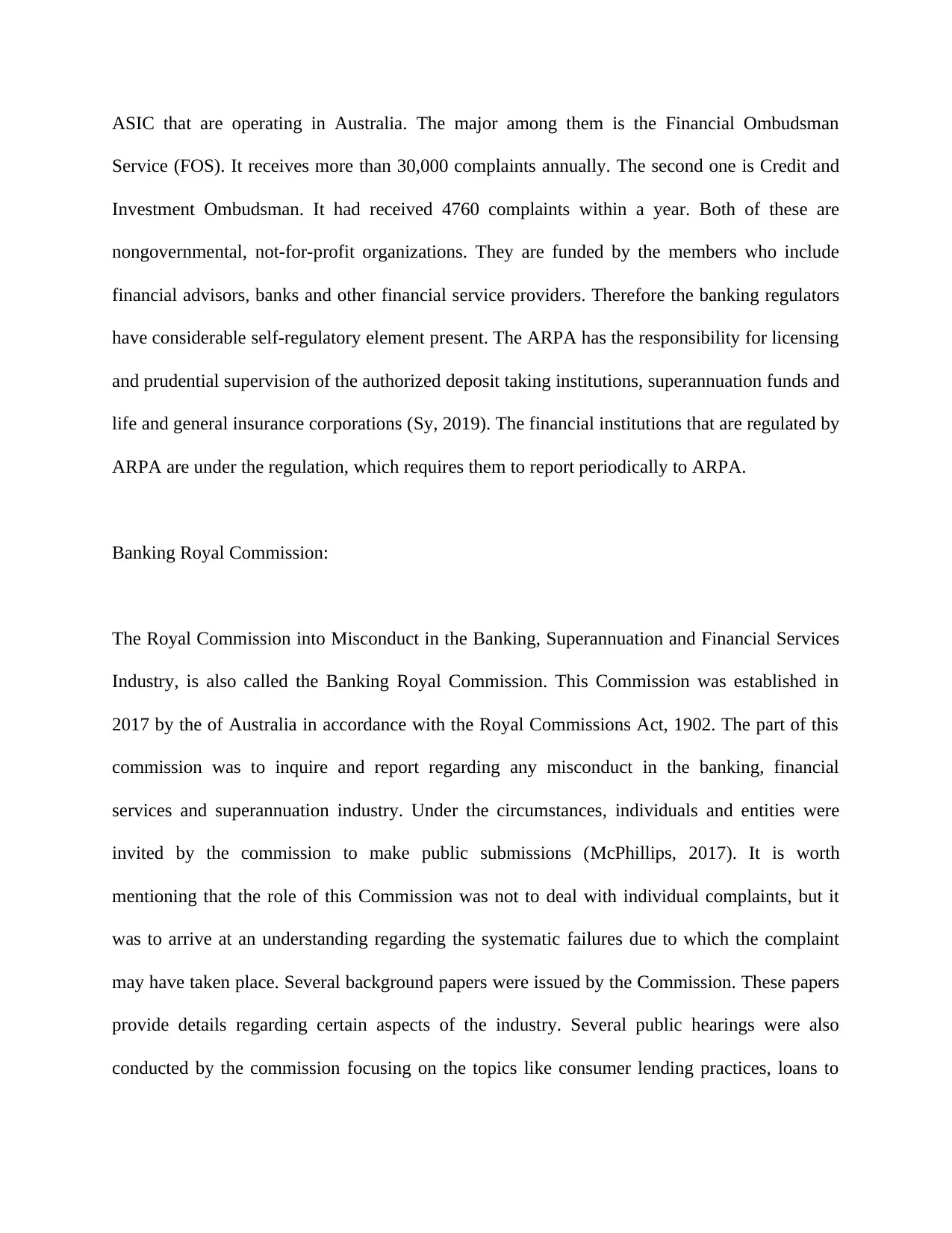
ASIC that are operating in Australia. The major among them is the Financial Ombudsman
Service (FOS). It receives more than 30,000 complaints annually. The second one is Credit and
Investment Ombudsman. It had received 4760 complaints within a year. Both of these are
nongovernmental, not-for-profit organizations. They are funded by the members who include
financial advisors, banks and other financial service providers. Therefore the banking regulators
have considerable self-regulatory element present. The ARPA has the responsibility for licensing
and prudential supervision of the authorized deposit taking institutions, superannuation funds and
life and general insurance corporations (Sy, 2019). The financial institutions that are regulated by
ARPA are under the regulation, which requires them to report periodically to ARPA.
Banking Royal Commission:
The Royal Commission into Misconduct in the Banking, Superannuation and Financial Services
Industry, is also called the Banking Royal Commission. This Commission was established in
2017 by the of Australia in accordance with the Royal Commissions Act, 1902. The part of this
commission was to inquire and report regarding any misconduct in the banking, financial
services and superannuation industry. Under the circumstances, individuals and entities were
invited by the commission to make public submissions (McPhillips, 2017). It is worth
mentioning that the role of this Commission was not to deal with individual complaints, but it
was to arrive at an understanding regarding the systematic failures due to which the complaint
may have taken place. Several background papers were issued by the Commission. These papers
provide details regarding certain aspects of the industry. Several public hearings were also
conducted by the commission focusing on the topics like consumer lending practices, loans to
Service (FOS). It receives more than 30,000 complaints annually. The second one is Credit and
Investment Ombudsman. It had received 4760 complaints within a year. Both of these are
nongovernmental, not-for-profit organizations. They are funded by the members who include
financial advisors, banks and other financial service providers. Therefore the banking regulators
have considerable self-regulatory element present. The ARPA has the responsibility for licensing
and prudential supervision of the authorized deposit taking institutions, superannuation funds and
life and general insurance corporations (Sy, 2019). The financial institutions that are regulated by
ARPA are under the regulation, which requires them to report periodically to ARPA.
Banking Royal Commission:
The Royal Commission into Misconduct in the Banking, Superannuation and Financial Services
Industry, is also called the Banking Royal Commission. This Commission was established in
2017 by the of Australia in accordance with the Royal Commissions Act, 1902. The part of this
commission was to inquire and report regarding any misconduct in the banking, financial
services and superannuation industry. Under the circumstances, individuals and entities were
invited by the commission to make public submissions (McPhillips, 2017). It is worth
mentioning that the role of this Commission was not to deal with individual complaints, but it
was to arrive at an understanding regarding the systematic failures due to which the complaint
may have taken place. Several background papers were issued by the Commission. These papers
provide details regarding certain aspects of the industry. Several public hearings were also
conducted by the commission focusing on the topics like consumer lending practices, loans to
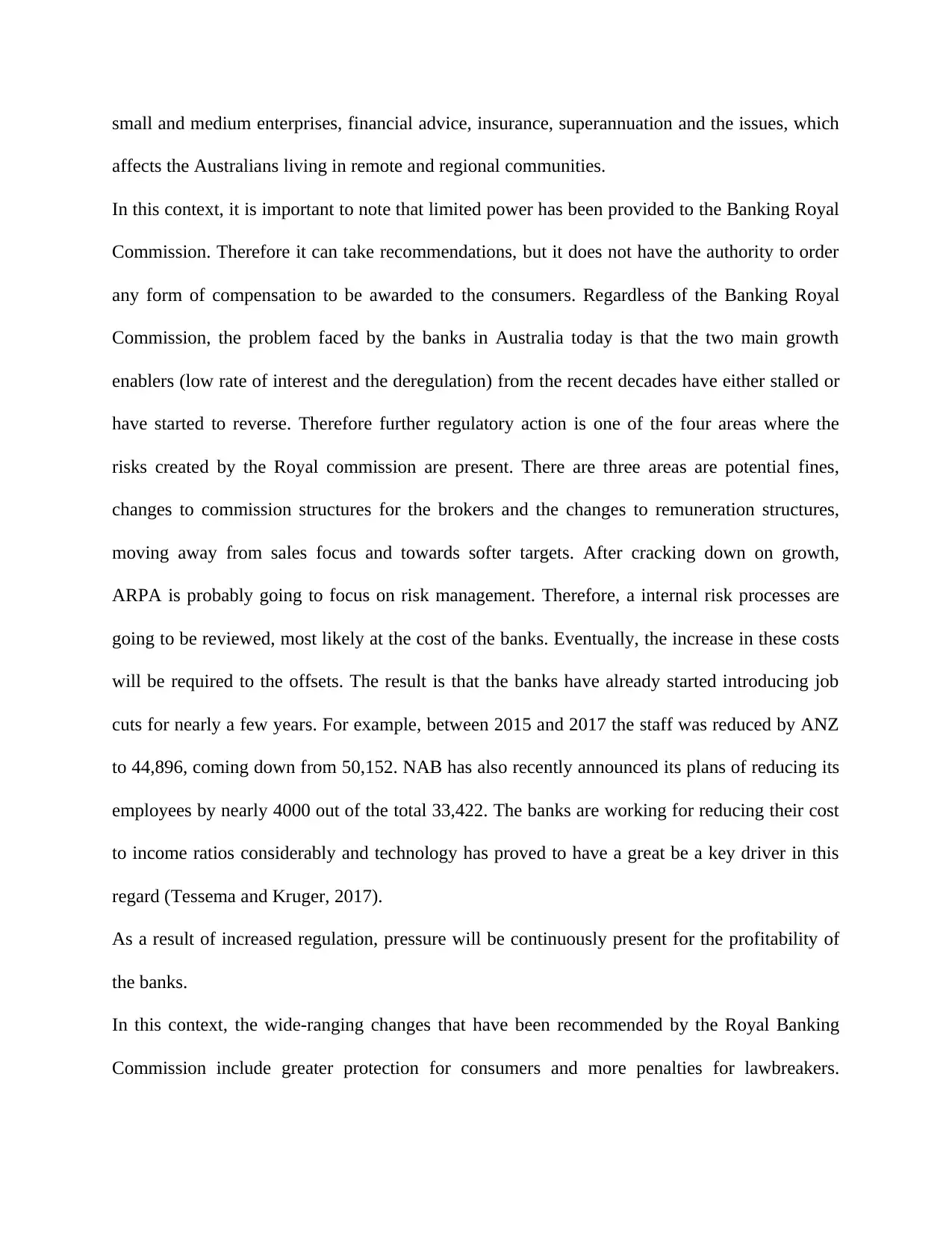
small and medium enterprises, financial advice, insurance, superannuation and the issues, which
affects the Australians living in remote and regional communities.
In this context, it is important to note that limited power has been provided to the Banking Royal
Commission. Therefore it can take recommendations, but it does not have the authority to order
any form of compensation to be awarded to the consumers. Regardless of the Banking Royal
Commission, the problem faced by the banks in Australia today is that the two main growth
enablers (low rate of interest and the deregulation) from the recent decades have either stalled or
have started to reverse. Therefore further regulatory action is one of the four areas where the
risks created by the Royal commission are present. There are three areas are potential fines,
changes to commission structures for the brokers and the changes to remuneration structures,
moving away from sales focus and towards softer targets. After cracking down on growth,
ARPA is probably going to focus on risk management. Therefore, a internal risk processes are
going to be reviewed, most likely at the cost of the banks. Eventually, the increase in these costs
will be required to the offsets. The result is that the banks have already started introducing job
cuts for nearly a few years. For example, between 2015 and 2017 the staff was reduced by ANZ
to 44,896, coming down from 50,152. NAB has also recently announced its plans of reducing its
employees by nearly 4000 out of the total 33,422. The banks are working for reducing their cost
to income ratios considerably and technology has proved to have a great be a key driver in this
regard (Tessema and Kruger, 2017).
As a result of increased regulation, pressure will be continuously present for the profitability of
the banks.
In this context, the wide-ranging changes that have been recommended by the Royal Banking
Commission include greater protection for consumers and more penalties for lawbreakers.
affects the Australians living in remote and regional communities.
In this context, it is important to note that limited power has been provided to the Banking Royal
Commission. Therefore it can take recommendations, but it does not have the authority to order
any form of compensation to be awarded to the consumers. Regardless of the Banking Royal
Commission, the problem faced by the banks in Australia today is that the two main growth
enablers (low rate of interest and the deregulation) from the recent decades have either stalled or
have started to reverse. Therefore further regulatory action is one of the four areas where the
risks created by the Royal commission are present. There are three areas are potential fines,
changes to commission structures for the brokers and the changes to remuneration structures,
moving away from sales focus and towards softer targets. After cracking down on growth,
ARPA is probably going to focus on risk management. Therefore, a internal risk processes are
going to be reviewed, most likely at the cost of the banks. Eventually, the increase in these costs
will be required to the offsets. The result is that the banks have already started introducing job
cuts for nearly a few years. For example, between 2015 and 2017 the staff was reduced by ANZ
to 44,896, coming down from 50,152. NAB has also recently announced its plans of reducing its
employees by nearly 4000 out of the total 33,422. The banks are working for reducing their cost
to income ratios considerably and technology has proved to have a great be a key driver in this
regard (Tessema and Kruger, 2017).
As a result of increased regulation, pressure will be continuously present for the profitability of
the banks.
In this context, the wide-ranging changes that have been recommended by the Royal Banking
Commission include greater protection for consumers and more penalties for lawbreakers.
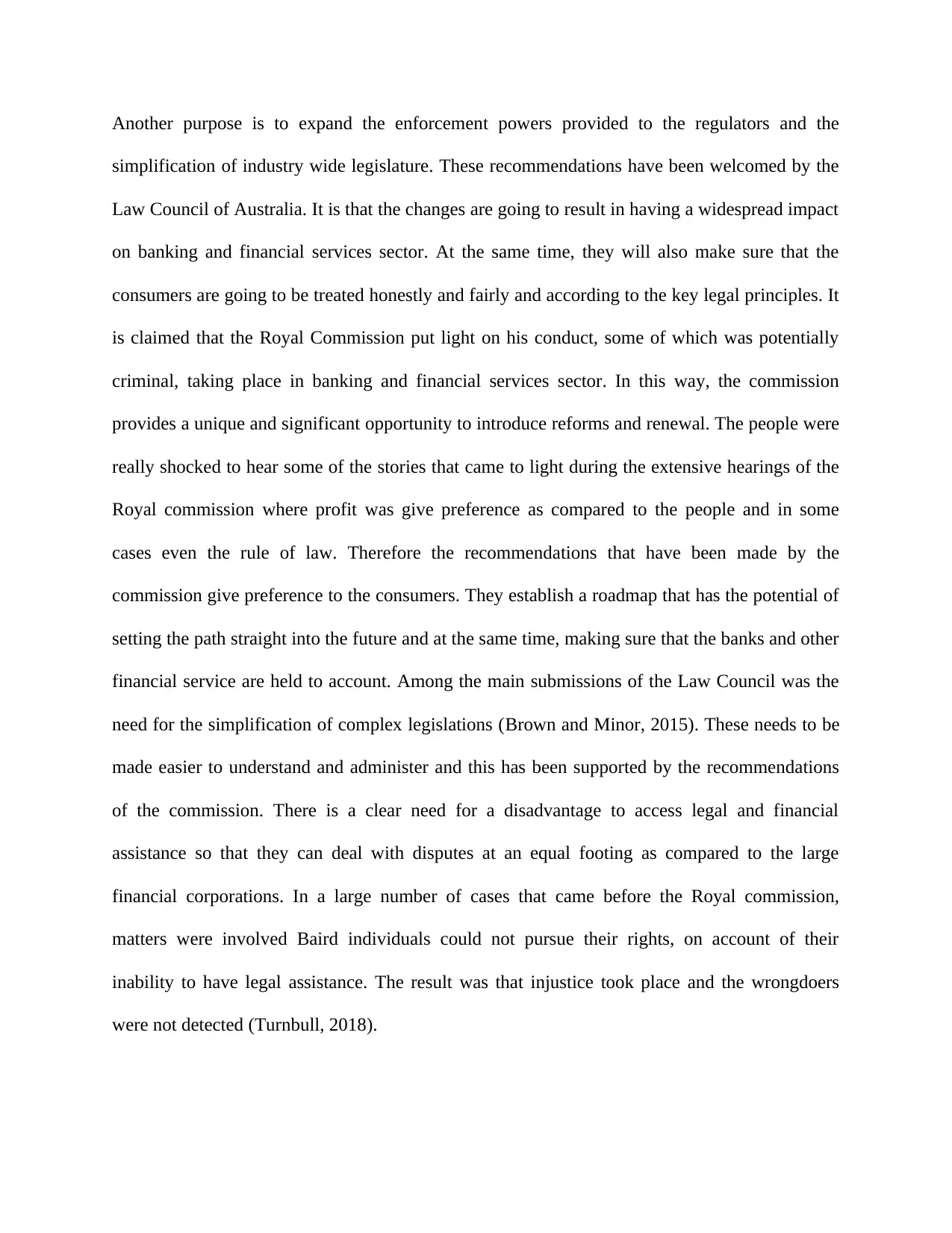
Another purpose is to expand the enforcement powers provided to the regulators and the
simplification of industry wide legislature. These recommendations have been welcomed by the
Law Council of Australia. It is that the changes are going to result in having a widespread impact
on banking and financial services sector. At the same time, they will also make sure that the
consumers are going to be treated honestly and fairly and according to the key legal principles. It
is claimed that the Royal Commission put light on his conduct, some of which was potentially
criminal, taking place in banking and financial services sector. In this way, the commission
provides a unique and significant opportunity to introduce reforms and renewal. The people were
really shocked to hear some of the stories that came to light during the extensive hearings of the
Royal commission where profit was give preference as compared to the people and in some
cases even the rule of law. Therefore the recommendations that have been made by the
commission give preference to the consumers. They establish a roadmap that has the potential of
setting the path straight into the future and at the same time, making sure that the banks and other
financial service are held to account. Among the main submissions of the Law Council was the
need for the simplification of complex legislations (Brown and Minor, 2015). These needs to be
made easier to understand and administer and this has been supported by the recommendations
of the commission. There is a clear need for a disadvantage to access legal and financial
assistance so that they can deal with disputes at an equal footing as compared to the large
financial corporations. In a large number of cases that came before the Royal commission,
matters were involved Baird individuals could not pursue their rights, on account of their
inability to have legal assistance. The result was that injustice took place and the wrongdoers
were not detected (Turnbull, 2018).
simplification of industry wide legislature. These recommendations have been welcomed by the
Law Council of Australia. It is that the changes are going to result in having a widespread impact
on banking and financial services sector. At the same time, they will also make sure that the
consumers are going to be treated honestly and fairly and according to the key legal principles. It
is claimed that the Royal Commission put light on his conduct, some of which was potentially
criminal, taking place in banking and financial services sector. In this way, the commission
provides a unique and significant opportunity to introduce reforms and renewal. The people were
really shocked to hear some of the stories that came to light during the extensive hearings of the
Royal commission where profit was give preference as compared to the people and in some
cases even the rule of law. Therefore the recommendations that have been made by the
commission give preference to the consumers. They establish a roadmap that has the potential of
setting the path straight into the future and at the same time, making sure that the banks and other
financial service are held to account. Among the main submissions of the Law Council was the
need for the simplification of complex legislations (Brown and Minor, 2015). These needs to be
made easier to understand and administer and this has been supported by the recommendations
of the commission. There is a clear need for a disadvantage to access legal and financial
assistance so that they can deal with disputes at an equal footing as compared to the large
financial corporations. In a large number of cases that came before the Royal commission,
matters were involved Baird individuals could not pursue their rights, on account of their
inability to have legal assistance. The result was that injustice took place and the wrongdoers
were not detected (Turnbull, 2018).
Secure Best Marks with AI Grader
Need help grading? Try our AI Grader for instant feedback on your assignments.
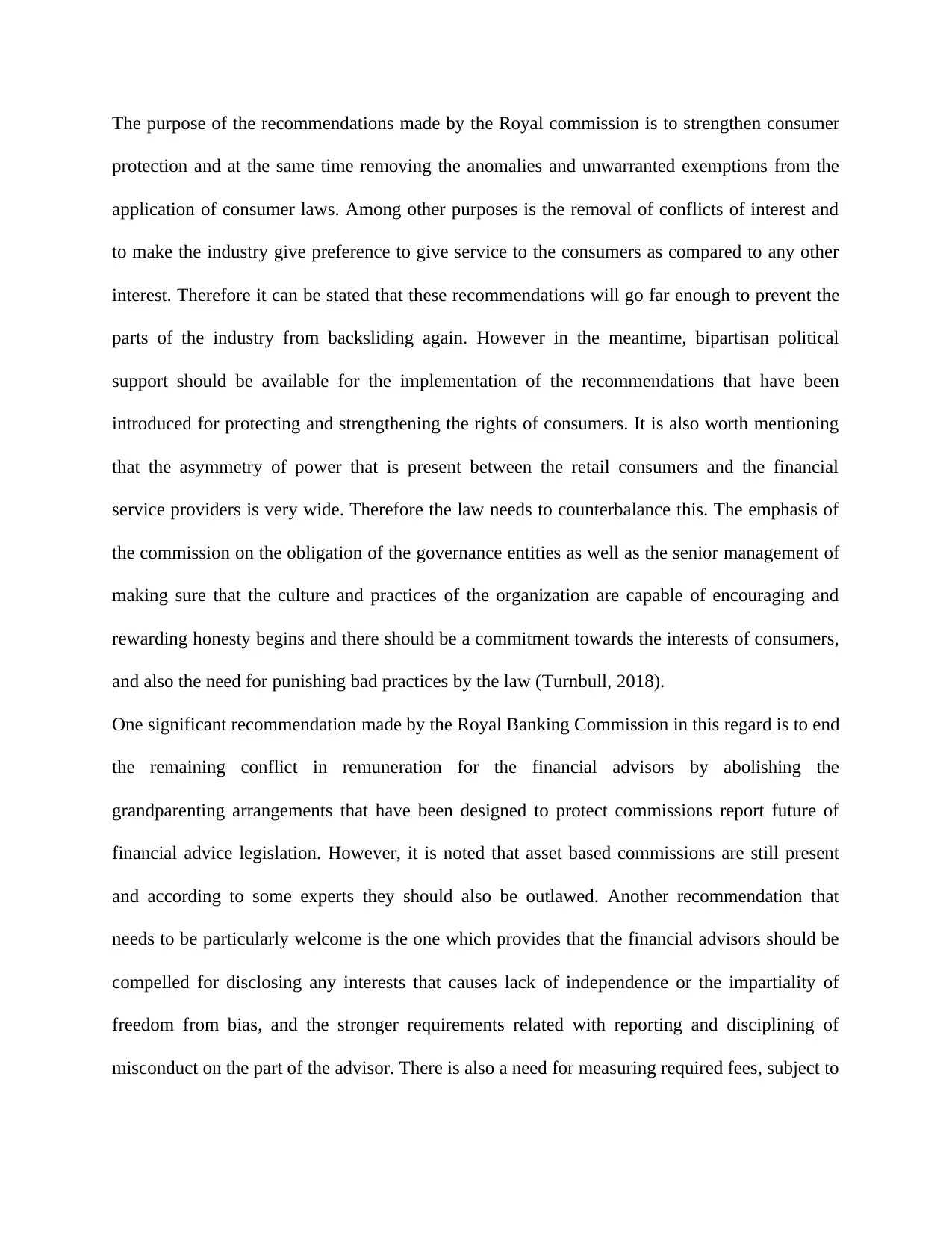
The purpose of the recommendations made by the Royal commission is to strengthen consumer
protection and at the same time removing the anomalies and unwarranted exemptions from the
application of consumer laws. Among other purposes is the removal of conflicts of interest and
to make the industry give preference to give service to the consumers as compared to any other
interest. Therefore it can be stated that these recommendations will go far enough to prevent the
parts of the industry from backsliding again. However in the meantime, bipartisan political
support should be available for the implementation of the recommendations that have been
introduced for protecting and strengthening the rights of consumers. It is also worth mentioning
that the asymmetry of power that is present between the retail consumers and the financial
service providers is very wide. Therefore the law needs to counterbalance this. The emphasis of
the commission on the obligation of the governance entities as well as the senior management of
making sure that the culture and practices of the organization are capable of encouraging and
rewarding honesty begins and there should be a commitment towards the interests of consumers,
and also the need for punishing bad practices by the law (Turnbull, 2018).
One significant recommendation made by the Royal Banking Commission in this regard is to end
the remaining conflict in remuneration for the financial advisors by abolishing the
grandparenting arrangements that have been designed to protect commissions report future of
financial advice legislation. However, it is noted that asset based commissions are still present
and according to some experts they should also be outlawed. Another recommendation that
needs to be particularly welcome is the one which provides that the financial advisors should be
compelled for disclosing any interests that causes lack of independence or the impartiality of
freedom from bias, and the stronger requirements related with reporting and disciplining of
misconduct on the part of the advisor. There is also a need for measuring required fees, subject to
protection and at the same time removing the anomalies and unwarranted exemptions from the
application of consumer laws. Among other purposes is the removal of conflicts of interest and
to make the industry give preference to give service to the consumers as compared to any other
interest. Therefore it can be stated that these recommendations will go far enough to prevent the
parts of the industry from backsliding again. However in the meantime, bipartisan political
support should be available for the implementation of the recommendations that have been
introduced for protecting and strengthening the rights of consumers. It is also worth mentioning
that the asymmetry of power that is present between the retail consumers and the financial
service providers is very wide. Therefore the law needs to counterbalance this. The emphasis of
the commission on the obligation of the governance entities as well as the senior management of
making sure that the culture and practices of the organization are capable of encouraging and
rewarding honesty begins and there should be a commitment towards the interests of consumers,
and also the need for punishing bad practices by the law (Turnbull, 2018).
One significant recommendation made by the Royal Banking Commission in this regard is to end
the remaining conflict in remuneration for the financial advisors by abolishing the
grandparenting arrangements that have been designed to protect commissions report future of
financial advice legislation. However, it is noted that asset based commissions are still present
and according to some experts they should also be outlawed. Another recommendation that
needs to be particularly welcome is the one which provides that the financial advisors should be
compelled for disclosing any interests that causes lack of independence or the impartiality of
freedom from bias, and the stronger requirements related with reporting and disciplining of
misconduct on the part of the advisor. There is also a need for measuring required fees, subject to
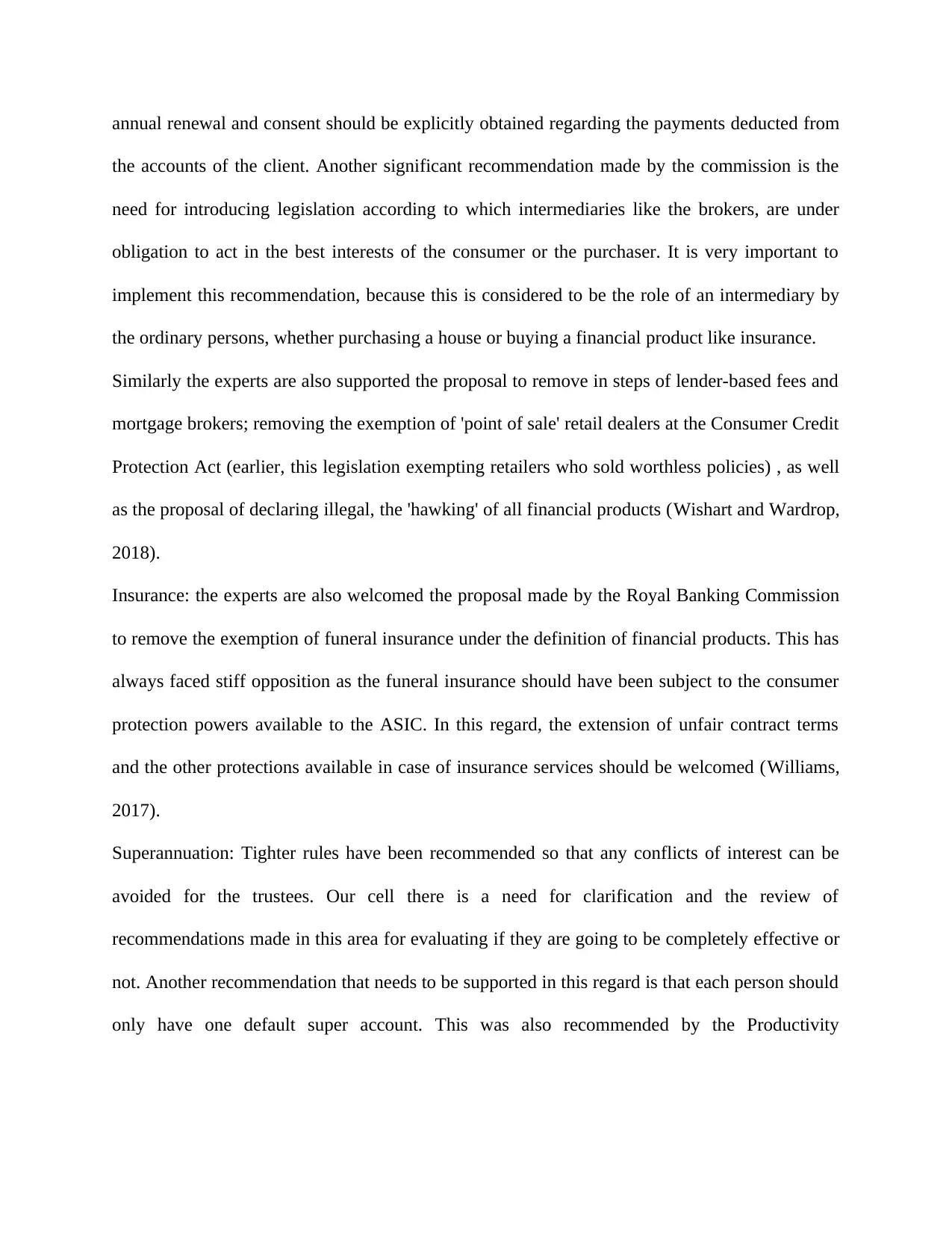
annual renewal and consent should be explicitly obtained regarding the payments deducted from
the accounts of the client. Another significant recommendation made by the commission is the
need for introducing legislation according to which intermediaries like the brokers, are under
obligation to act in the best interests of the consumer or the purchaser. It is very important to
implement this recommendation, because this is considered to be the role of an intermediary by
the ordinary persons, whether purchasing a house or buying a financial product like insurance.
Similarly the experts are also supported the proposal to remove in steps of lender-based fees and
mortgage brokers; removing the exemption of 'point of sale' retail dealers at the Consumer Credit
Protection Act (earlier, this legislation exempting retailers who sold worthless policies) , as well
as the proposal of declaring illegal, the 'hawking' of all financial products (Wishart and Wardrop,
2018).
Insurance: the experts are also welcomed the proposal made by the Royal Banking Commission
to remove the exemption of funeral insurance under the definition of financial products. This has
always faced stiff opposition as the funeral insurance should have been subject to the consumer
protection powers available to the ASIC. In this regard, the extension of unfair contract terms
and the other protections available in case of insurance services should be welcomed (Williams,
2017).
Superannuation: Tighter rules have been recommended so that any conflicts of interest can be
avoided for the trustees. Our cell there is a need for clarification and the review of
recommendations made in this area for evaluating if they are going to be completely effective or
not. Another recommendation that needs to be supported in this regard is that each person should
only have one default super account. This was also recommended by the Productivity
the accounts of the client. Another significant recommendation made by the commission is the
need for introducing legislation according to which intermediaries like the brokers, are under
obligation to act in the best interests of the consumer or the purchaser. It is very important to
implement this recommendation, because this is considered to be the role of an intermediary by
the ordinary persons, whether purchasing a house or buying a financial product like insurance.
Similarly the experts are also supported the proposal to remove in steps of lender-based fees and
mortgage brokers; removing the exemption of 'point of sale' retail dealers at the Consumer Credit
Protection Act (earlier, this legislation exempting retailers who sold worthless policies) , as well
as the proposal of declaring illegal, the 'hawking' of all financial products (Wishart and Wardrop,
2018).
Insurance: the experts are also welcomed the proposal made by the Royal Banking Commission
to remove the exemption of funeral insurance under the definition of financial products. This has
always faced stiff opposition as the funeral insurance should have been subject to the consumer
protection powers available to the ASIC. In this regard, the extension of unfair contract terms
and the other protections available in case of insurance services should be welcomed (Williams,
2017).
Superannuation: Tighter rules have been recommended so that any conflicts of interest can be
avoided for the trustees. Our cell there is a need for clarification and the review of
recommendations made in this area for evaluating if they are going to be completely effective or
not. Another recommendation that needs to be supported in this regard is that each person should
only have one default super account. This was also recommended by the Productivity
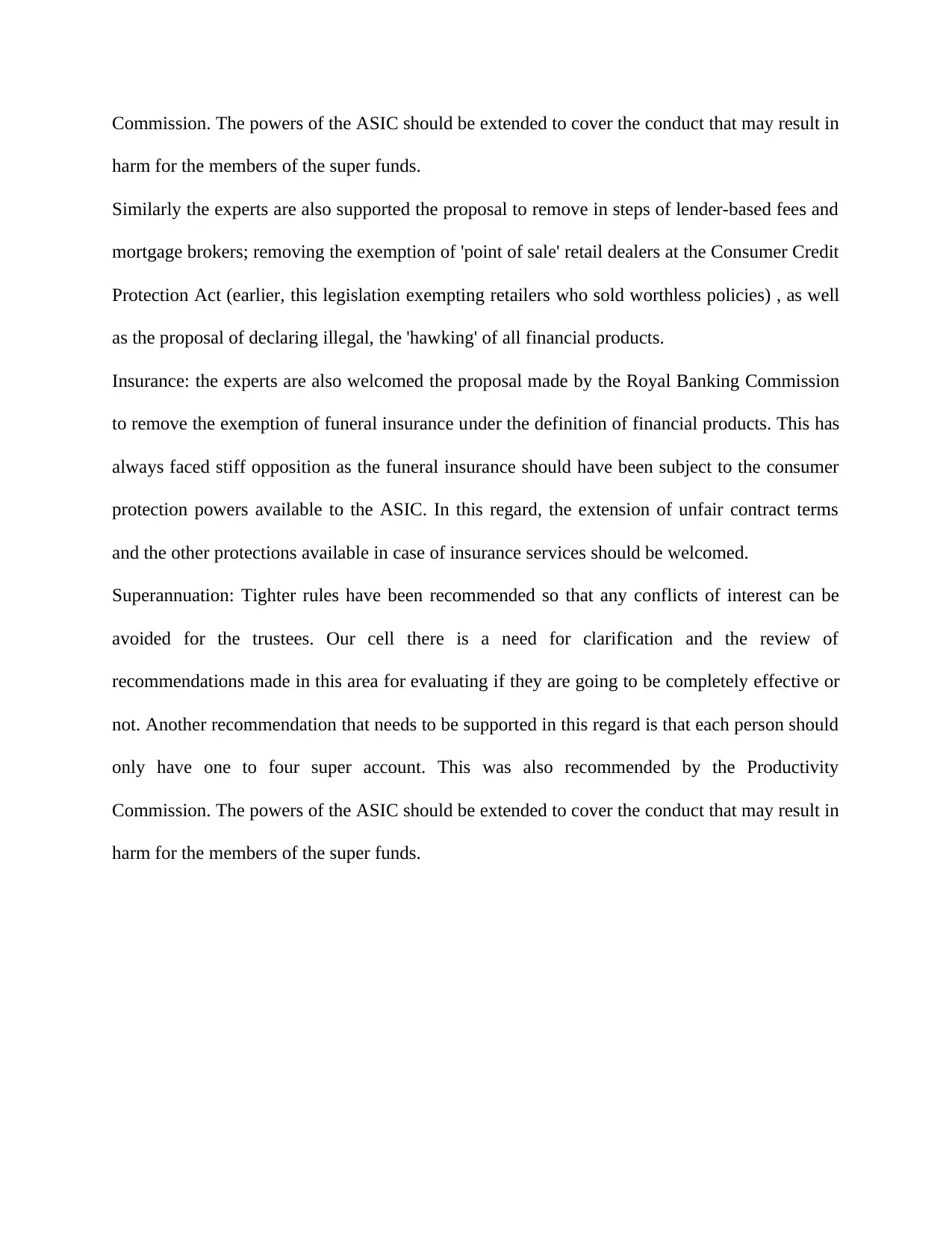
Commission. The powers of the ASIC should be extended to cover the conduct that may result in
harm for the members of the super funds.
Similarly the experts are also supported the proposal to remove in steps of lender-based fees and
mortgage brokers; removing the exemption of 'point of sale' retail dealers at the Consumer Credit
Protection Act (earlier, this legislation exempting retailers who sold worthless policies) , as well
as the proposal of declaring illegal, the 'hawking' of all financial products.
Insurance: the experts are also welcomed the proposal made by the Royal Banking Commission
to remove the exemption of funeral insurance under the definition of financial products. This has
always faced stiff opposition as the funeral insurance should have been subject to the consumer
protection powers available to the ASIC. In this regard, the extension of unfair contract terms
and the other protections available in case of insurance services should be welcomed.
Superannuation: Tighter rules have been recommended so that any conflicts of interest can be
avoided for the trustees. Our cell there is a need for clarification and the review of
recommendations made in this area for evaluating if they are going to be completely effective or
not. Another recommendation that needs to be supported in this regard is that each person should
only have one to four super account. This was also recommended by the Productivity
Commission. The powers of the ASIC should be extended to cover the conduct that may result in
harm for the members of the super funds.
harm for the members of the super funds.
Similarly the experts are also supported the proposal to remove in steps of lender-based fees and
mortgage brokers; removing the exemption of 'point of sale' retail dealers at the Consumer Credit
Protection Act (earlier, this legislation exempting retailers who sold worthless policies) , as well
as the proposal of declaring illegal, the 'hawking' of all financial products.
Insurance: the experts are also welcomed the proposal made by the Royal Banking Commission
to remove the exemption of funeral insurance under the definition of financial products. This has
always faced stiff opposition as the funeral insurance should have been subject to the consumer
protection powers available to the ASIC. In this regard, the extension of unfair contract terms
and the other protections available in case of insurance services should be welcomed.
Superannuation: Tighter rules have been recommended so that any conflicts of interest can be
avoided for the trustees. Our cell there is a need for clarification and the review of
recommendations made in this area for evaluating if they are going to be completely effective or
not. Another recommendation that needs to be supported in this regard is that each person should
only have one to four super account. This was also recommended by the Productivity
Commission. The powers of the ASIC should be extended to cover the conduct that may result in
harm for the members of the super funds.
Paraphrase This Document
Need a fresh take? Get an instant paraphrase of this document with our AI Paraphraser
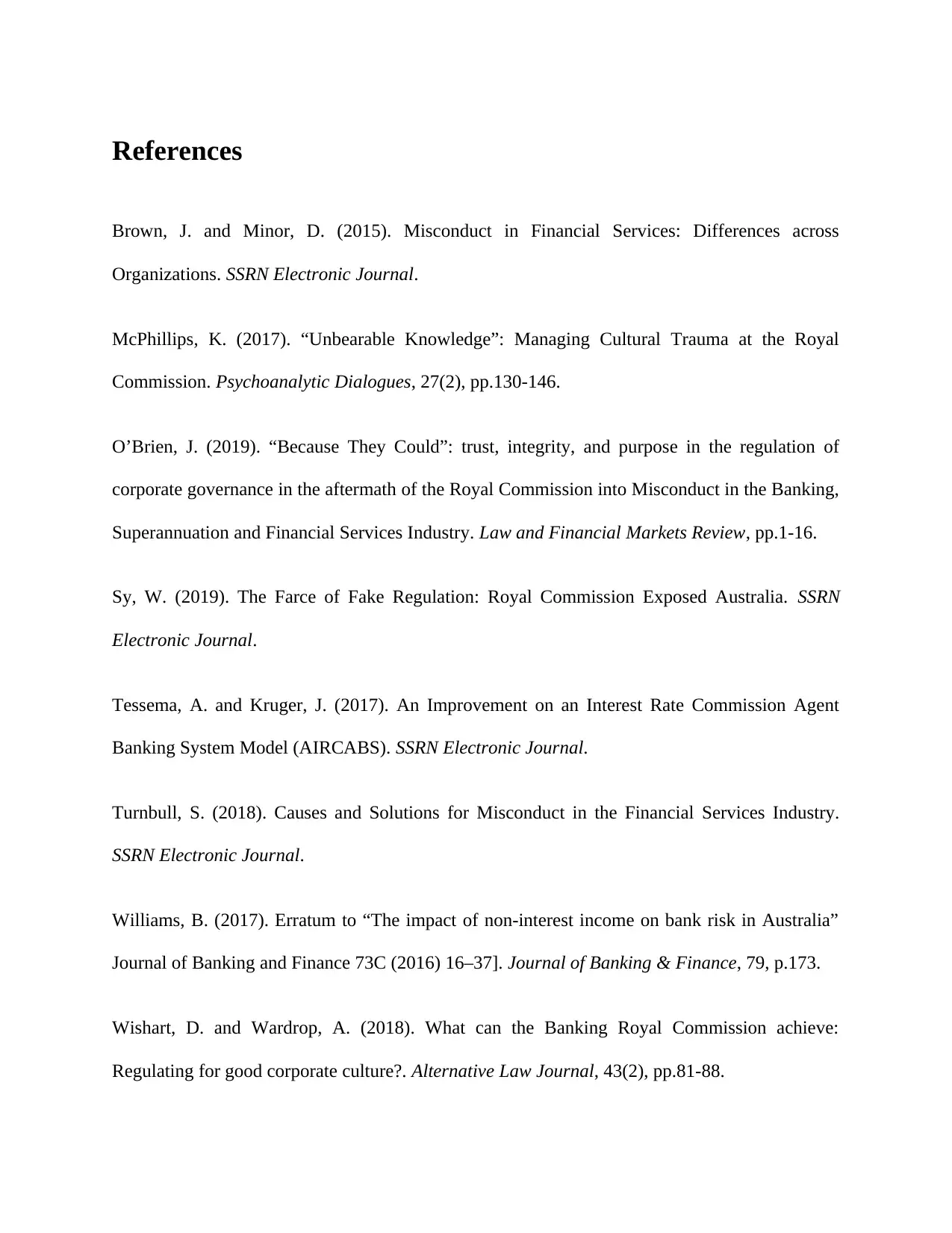
References
Brown, J. and Minor, D. (2015). Misconduct in Financial Services: Differences across
Organizations. SSRN Electronic Journal.
McPhillips, K. (2017). “Unbearable Knowledge”: Managing Cultural Trauma at the Royal
Commission. Psychoanalytic Dialogues, 27(2), pp.130-146.
O’Brien, J. (2019). “Because They Could”: trust, integrity, and purpose in the regulation of
corporate governance in the aftermath of the Royal Commission into Misconduct in the Banking,
Superannuation and Financial Services Industry. Law and Financial Markets Review, pp.1-16.
Sy, W. (2019). The Farce of Fake Regulation: Royal Commission Exposed Australia. SSRN
Electronic Journal.
Tessema, A. and Kruger, J. (2017). An Improvement on an Interest Rate Commission Agent
Banking System Model (AIRCABS). SSRN Electronic Journal.
Turnbull, S. (2018). Causes and Solutions for Misconduct in the Financial Services Industry.
SSRN Electronic Journal.
Williams, B. (2017). Erratum to “The impact of non-interest income on bank risk in Australia”
Journal of Banking and Finance 73C (2016) 16–37]. Journal of Banking & Finance, 79, p.173.
Wishart, D. and Wardrop, A. (2018). What can the Banking Royal Commission achieve:
Regulating for good corporate culture?. Alternative Law Journal, 43(2), pp.81-88.
Brown, J. and Minor, D. (2015). Misconduct in Financial Services: Differences across
Organizations. SSRN Electronic Journal.
McPhillips, K. (2017). “Unbearable Knowledge”: Managing Cultural Trauma at the Royal
Commission. Psychoanalytic Dialogues, 27(2), pp.130-146.
O’Brien, J. (2019). “Because They Could”: trust, integrity, and purpose in the regulation of
corporate governance in the aftermath of the Royal Commission into Misconduct in the Banking,
Superannuation and Financial Services Industry. Law and Financial Markets Review, pp.1-16.
Sy, W. (2019). The Farce of Fake Regulation: Royal Commission Exposed Australia. SSRN
Electronic Journal.
Tessema, A. and Kruger, J. (2017). An Improvement on an Interest Rate Commission Agent
Banking System Model (AIRCABS). SSRN Electronic Journal.
Turnbull, S. (2018). Causes and Solutions for Misconduct in the Financial Services Industry.
SSRN Electronic Journal.
Williams, B. (2017). Erratum to “The impact of non-interest income on bank risk in Australia”
Journal of Banking and Finance 73C (2016) 16–37]. Journal of Banking & Finance, 79, p.173.
Wishart, D. and Wardrop, A. (2018). What can the Banking Royal Commission achieve:
Regulating for good corporate culture?. Alternative Law Journal, 43(2), pp.81-88.
1 out of 8
Related Documents
Your All-in-One AI-Powered Toolkit for Academic Success.
+13062052269
info@desklib.com
Available 24*7 on WhatsApp / Email
![[object Object]](/_next/static/media/star-bottom.7253800d.svg)
Unlock your academic potential
© 2024 | Zucol Services PVT LTD | All rights reserved.





